Saturday, October 29. 2011
Open Access Doubts (and Reassurances)
 In "Open Access Doubts" Eric F. Van de Velde lists some doubts about open access (OA).
In "Open Access Doubts" Eric F. Van de Velde lists some doubts about open access (OA).There are very simple answers to each of Eric's doubts. The doubts arise mostly from a library-based rather than a research-based perception of the OA problem and its solution.
There is only one doubt that is most definitely justified, though Eric has not expressed it: Researchers themselves -- even though they and their research are the primary losers because of access-denial, and the primary beneficiaries of providing OA -- are not providing OA in sufficient numbers until and unless it is mandated by their institutions and funders.
That does raise some doubts, but not about the feasibility or benefits of OA -- only about the alertness of researchers to their own needs and the way to meet them.
EV:Affordable is not better than free because even if journal subscriptions were sold at cost, with no profit margin at all, not all or even most institutions could afford to subscribe to all or even most peer-reviewed journals.
Assessing the ongoing Open Access experiment, where are our doubts? I have three:
Is Affordable Better than Free?
The purpose of OA is to provide online access to all would-be users, not just to those whose institutions can afford a subscription to the journal in which it was published.
Eric is conflating the journal affordability and the research accessibility problems.
EV:No, researchers are not being denied access to peer-reviewed research because of "inexpertly formatted content and bad, incomplete, and non-public (!) metadata" but because of content to which (a) their institution cannot afford access and (b) that has not been made OA at all.
A robust and user-friendly network of open scholarly systems seems farther away than ever because of inexpertly formatted content and bad, incomplete, and non-public (!) metadata.
It is librarians who worry about formatting and metadata! Researchers worry about inaccessible content.
EV:Cost is not the OA problem: Access-denial is. Lowering cost is a library's goal. Gaining access is the user's need. And even lowering prices to cost-without-any-profit does not remedy access-denial
While there is always room for improvement, pay-walled journals provide professionally formatted and organized content with excellent metadata and robust services. The problem is cost. Unfortunately, we did nothing to reduce cost. We only negotiated prices.
EV:No, the root of the problem is access-denial and the solution is access-provision. And the way to provide OA is for authors to self-archive their refereed final drafts ("green OA"). And the way to ensure that authors self-archive is to mandate it.
The root of the problem is site licenses... Site licenses are market-distorting products that preserve paper-era business processes of publishers, aggregators, and libraries.
EV:Instead of mandating green OA (cost-free), cancel all subscriptions and give the funds to researchers, and the market will take care of the rest?
Universities can cut the Gordian knot right now by replacing site licenses with direct subsidies to researchers…Researchers, empowered to make individual price-value judgments, would become consumers in a suddenly competitive market for content and information services.
Eric, when many of us are struggling to get something concrete and practical that has already been tried, tested, and proven effective -- namely, green OA mandates -- to be implemented by more institutions after 15 years of needlessly lost research access and impact, I don't think this is the opportune time to try or even contemplate rather speculative hypotheses!
EV:If "release hidden information" (1) means provide online access to refereed research to which access is currently denied to users at non-subscribing institutions, then this is the one and only fundamental rationale for OA, and has been ever since the online era made it feasible. (But I'm afraid this might not even be what Eric means by "release hidden information"!)
What are the Goals of Institutional Repositories?
Open Access advocates have articulated at least five goals for institutional repositories: (1) release hidden information, (2) rein in journal prices, (3) archive an institution’s scholarly record, (4) enable fast research communication, and (5) provide free access to author-formatted articles.
EV:An institution's scholarly record is already "archived" in the journals in which is was published (3) (all of them are now online and archived at the publisher's toll-gated website). The trouble is that the institution itself has no record of its own research output. (Mandating green OA provides that.)
The other four goals are secondary ones: If all refereed research is (green) OA, whether or not it reins in journal prices (2) is secondary, since all users have access, whether or not their institutions can afford to buy access.
OA doesn't just speed up research communication and progress (4), it maximizes research progress (by making it accessible to researchers who are otherwise denied access). That's not just speed: it's access and hence uptake, usage and impact.
And the purpose of OA is to provide free access for all would-be users, whether or not their institutions can afford paid access to the publisher's version of record. Access to the author's refereed final draft (5) may sound like less than perfect for a librarian, but it is the difference between night and day for an otherwise access-denied researcher.
EV:This is a profound error and misunderstanding: The fundamental reason for providing OA is to "release" published information that was only accessible to users at subscribing institutions rather than to all would-be users. It is not about information that had "no suitable distribution platform." (Although pre-refereeing papers, other kinds of research content, and even the "grey" literature are all welcome in repositories too, OA's first and foremost target content is refereed, published research.)
Institutional repositories are ideal vehicles for releasing hidden information that, until recently, had no suitable distribution platform (1).
EV:Eric is conflating "gold" OA publishing with green OA self-archiving here: Green OA is a supplement, not a substitute, for refereed research journals. No "credible alternative intended": just a remedy for access-denial.
Institutional repositories fall short as a mechanism to rein in journal prices (2), because they are not a credible alternative for the current archival scholarly record.
And the goal of OA itself is not to "rein in journal prices" but to provide online access for all users, not just the ones whose institutions can afford the journal prices.
So Eric is again conflating the problem of journal affordability with the problem of research accessibility.
EV:Without lowering prices, access-denial to users whose institutions cannot afford subscriptions is irrelevant?
Without (2), goals (3), (4), and (5) are irrelevant. If we pay for journals anyway, we can achieve (3) by maintaining a database of links to the formal literature. Secure in the knowledge that their journals are not in jeopardy, publishers would be happy to provide (4) and (5).
Keep paying their subscriptions and journals will provide access for those who can't afford to pay for it?
Perhaps what Eric means is that if all subscribing institutions promised to keep paying the asking price in perpetuo, then journals would agree to make all their contents OA?
But who would (or could) make such a (foolish) promise?
EV:The HEP community is the only one in the world that has already provided (green) OA for itself without the need for a mandate. Hence there is effectively no more access denial worldwide for the HEP subset of the journal literature. The HEP community has effectively solved its accessibility problem.
A scenario consistent with this analysis is unfolding right now. The HEP community launched a rescue mission for HEP journals, which lost much of their role to arXiv.
What the HEP community does as a follow-up, to address the affordability problem, is of far less concern and relevance to the rest of the scholarly and scientific community, which is still afflicted with access denial (and its resulting loss in research usage, progress and impact). What the non-HEP world needs is OA.
But it should be mentioned that the SCOAP3 project is effectively the one that I called into question above: No institution can or will guarantee that it will keep paying for subscriptions in perpetuo. So the jury is still out on whether such a scheme is sustainable. But we already know it is not scalable beyond HEP, because the non-HEP world has not yet even taken the first essential step, which is to provide green OA.
That's why green OA mandates are needed.
Publishing reform will take care of itself after OA has (green) become universal -- not before.
EV:SCOAP3 is a consortial "membership" solution about whose sustainability and scalability there are, as noted, good reasons to have doubts.
The SCOAP3 initiative pools funds currently spent on site-licensing HEP journals. This strikes me as a heavy-handed approach to protect existing revenue streams of established journals. On the other hand, SCOAP3 protects the quality of the HEP archival scholarly record and converts HEP journals to the open-access model.
But it is irrelevant. Because HEP already has (green) OA, unmandated, whereas the rest of the scholarly and scientific world does not.
EV:Harnad, S. (2010) No-Fault Peer Review Charges: The Price of Selectivity Need Not Be Access Denied or Delayed. D-Lib Magazine 16 (7/8).
Are Open-Access Journals a Form of Vanity Publishing?
If a journal’s scholarly discipline loses influence or if its editorial board lowers its standards, the journal’s standing diminishes and various quality assessments fall.
ABSTRACT:Plans by universities and research funders to pay the costs of Open Access Publishing ("Gold OA") are premature. Funds are short; 80% of journals (including virtually all the top journals) are still subscription-based, tying up the potential funds to pay for Gold OA; the asking price for Gold OA is still high; and there is concern that paying to publish may inflate acceptance rates and lower quality standards. What is needed now is for universities and funders to mandate OA self-archiving (of authors' final peer-reviewed drafts, immediately upon acceptance for publication) ("Green OA"). That will provide immediate OA; and if and when universal Green OA should go on to make subscriptions unsustainable (because users are satisfied with just the Green OA versions) that will in turn induce journals to cut costs (print edition, online edition, access-provision, archiving), downsize to just providing the service of peer review, and convert to the Gold OA cost-recovery model; meanwhile, the subscription cancellations will have released the funds to pay these residual service costs. The natural way to charge for the service of peer review then will be on a "no-fault basis," with the author's institution or funder paying for each round of refereeing, regardless of outcome (acceptance, revision/re-refereeing, or rejection). This will minimize cost while protecting against inflated acceptance rates and decline in quality standards.
Harnad, S. (2011) Gold Open Access Publishing Must Not Be Allowed to Retard the Progress of Green Open Access Self-Archiving. Logos 21(3-4): 86-93
ABSTRACT:Universal Open Access (OA) is fully within the reach of the global research community: Research institutions and funders need merely mandate (green) OA self-archiving of the final, refereed drafts of all journal articles immediately upon acceptance for publication. The money to pay for gold OA publishing will only become available if universal green OA eventually makes subscriptions unsustainable. Paying for gold OA pre-emptively today, without first having mandated green OA not only squanders scarce money, but it delays the attainment of universal OA.
EV:Eric, I know (and an old friend and comrade-at-arms!)...
“Stevan: Remember, I am an OA supporter”
EV:Me too (though I've been discouraged about that for about 15 years now...).
“though I am getting discouraged about the slow progress.”
EV:Independent of OA. (So who's conflating now? Your doubts were billed as being about OA, not about the cost of scholarly publishing...
“You raise good points, but I think you are the one conflating issues. I will try to keep them separate. 1. Journal pricing: Independent of OA, it is important to take the cost of scholarly publishing down.”
EV:The affordability problem: not the accessibility problem.
“The argument I made in earlier blog posts is that site licenses are the root cause of the cost problem.”
EV:Speculative or non-speculative, it is not the research accessibility problem, and it does not solve it.
“It is time for libraries to get out of the banal role of middleman, and let researchers manage their own subscriptions. You call that a speculative hypothesis. I call it restoring a real free market...”
EV:The way to get everyone to join is for all institutions and funders to mandate it.
“I agree that Green Open Access would solve the access problem... provided everyone joins the initiative. The problem is, too few are joining”
EV:What is too difficult to use? I have no trouble using the OA content that's there. The problem is that most of it (85%) isn't there. That's why the mandates are needed.
“and because of quality control issues too difficult to use.”
EV:You're right, so now EnablingOpenScholarship (EOS) is working to guide institutions on how to optimize those mandates by getting rid of their loopholes: http://bit.ly/EOSoaPolicy
“The mandate movement is getting some traction, but most mandates come with loopholes.”
EV:My patience ran out long ago! (For some perverse reason, I'm still plugging away at it...)
“So, I am getting discouraged. I wonder when patience runs out.”
EV:And it is not intended to. It is intended to solve the access problem of researchers.
“We both agree that Green Open Access does not solve the cost problem of journals.”
EV:1. Green OA's cost per paper deposited is negligible. With 100% deposit (because of 100% mandates), even lower.
“You say that journal prices do not matter with Green OA in place. I say they do, because universities end up underwriting two overlapping systems... Admittedly, Green OA is the better bargain. But if Green OA is not reducing the cost of the other, it just adds to the total cost.”
2. Green OA, if mandated, can provide 100% OA, solving 100% of the accessibility problem.
3. The journal affordability problem is not the same problem, and we've agreed not to conflate them (remember?).
EV:That's their problem and their look-out (because we've agreed not to conflate, right?). I've many times cautioned that SCOAP3 is premature, unnecessary, unscalable and unsustainable. But I don't care if I'm ignored: I'm too busy being ignored on how to solve the accessibility problem to worry about being ignored on how not to solve the affordability problem!
“In the one example in which Green OA is near universal [SCPAP3], scholars are working hard to make sure their journals can maintain their current revenue stream.”
EV:An implicit promise there are strong reasons to expect that they cannot and will not keep, in the long term: http://bit.ly/ScoapCope But, again, that's another problem, not my problem, not the accessibility problem.
“There may be no explicit promise to maintain current subscriptions, but there certainly is an implicit one.”
EV:Academics (and research itself) both need peer review. Journals provide the peer review. (In the online era, they need no longer provide access and the archival record, but they do that too. Eventually they won't have to.) But just as OA is not the journal affordability problem, it is not the problem of the future of publishing either. Green OA changes none of this: It just solves the accessibility problem.
“Current academics are scared to lose the formal scholarly record in its current form and the editorial boards that control the refereeing process.”
EV:They are right.
“they are convinced that the journals in which they publish and on whose editorial boards they sit deserve to survive.”
EV:This is a bit simplistic: Researchers want their quality journals, and they want the journals they read and publish in (all three are not always the same). Providing (and mandating) green OA does not change any of this (though it might eventually induce downsizing to peer review alone, and conversion to the gold OA model to recover peer review's much lower costs):
“It is the other journals, the ones in which they do not publish and on whose boards they do not sit, that are too costly and should disappear.”
Harnad, S. (2007) The Green Road to Open Access: A Leveraged Transition. In: The Culture of Periodicals from the Perspective of the Electronic Age, pp. 99-105, L'Harmattan.
ABSTRACT: What the research community needs, urgently, is free online access (Open Access, OA) to its own peer-reviewed research output. Researchers can provide that in two ways: by publishing their articles in OA journals (Gold OA) or by continuing to publish in non-OA journals and self-archiving their final peer-reviewed drafts in their own OA Institutional Repositories (Green OA). OA self-archiving, once it is mandated by research institutions and funders, can reliably generate 100% Green OA. Gold OA requires journals to convert to OA publishing (which is not in the hands of the research community) and it also requires the funds to cover the Gold OA publication costs. With 100% Green OA, the research community's access and impact problems are already solved. If and when 100% Green OA should cause significant cancellation pressure (no one knows whether or when that will happen, because OA Green grows anarchically, article by article, not journal by journal) then the cancellation pressure will cause cost-cutting, downsizing and eventually a leveraged transition to OA (Gold) publishing on the part of journals. As subscription revenues shrink, institutional windfall savings from cancellations grow. If and when journal subscriptions become unsustainable, per-article publishing costs will be low enough, and institutional savings will be high enough to cover them, because publishing will have downsized to just peer-review service provision alone, offloading text-generation onto authors and access-provision and archiving onto the global network of OA Institutional Repositories. Green OA will have leveraged a transition to Gold OA.
EV:How have you managed to draw me into a discussion of journal pricing and affordability, Eric, when we had agreed we were not going to conflate that with the OA problem? ;>)
“Free markets are set up to deal with exactly this kind of problem. The current system takes end users out of the price-value evaluation and has led to an unrestricted growth of the scholarly literature.”
EV:But Eric, I'm also strongly in favor of putting an end to our unnecessary and cruel slaughter of animals in order to please our palates - but I don't conflate that with OA either! Why must I speculate about the scholarly-journal business when all I want is that institutions and funders should mandate green OA self-archiving?
“So, by all means, continue Green OA. However, also bring a real free market to the scholarly-journal business.”
Stevan Harnad
EnablingOpenScholarship (EOS)
Thursday, February 25. 2010
Alma Swan JISC Report: How to build a business case for an Open Access policy
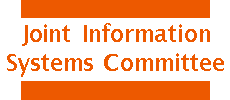

Alma Swan
University of Southampton
EnablingOpenScholarship (EOS) &
Key Perspectives
How to build a business case for an Open Access policy
Full version of the report
Podcast interview with Alma Swan and Neil Jacobs
A new report launched today (25 February 2010) shows how universities can work out how much they could save on their profit and loss accounts as well as increasing their contribution to UK plc when they share their research papers through Open Access.
The ‘modelling scholarly communication options: costs and benefits for universities’ report, written by Alma Swan, is based on different types of university. It shows how universities might reduce costs, how they can calculate these saving and their greater contribution to society by following an Open Access route.
Neil Jacobs, programme manager at JISC says, “This is the first time that universities will have a method and practical examples from which to build a business case for Open Access and to calculate the cost to them of the scholarly communications process. For example working out the value of researchers carrying out peer-reviewing duties or the comparative costs of the library handling of journals subscribed to in print, electronically, or in both formats.
“As universities such as Edinburgh, Salford and UCL lead the world to mandate self-archiving and adopt Open Access policies, this report gives evidence to help universities make informed decisions about how their research is disseminated. There are still issues to overcome and the benefits of adopting an Open Access route can be seen through economies of scale, the more researchers disseminate their work through this route the greater the benefits.”
The key findings from the report show:
• The annual savings in research and library costs of a university repository model combined with subscription publishing could range from £100,000 to £1,320,000Jacobs adds: “While some research intensive universities may pay more for the subscription-funding to per-article Open Access journal scenario, it should be noted that many research funders, including the Research Councils and Wellcome Trust, may contribute article-processing charges as a part of normal research grants, so that all universities have a potential source of income to cover the majority of such costs.
• Moving from Open Access journals and subscription-funding to per-article Open Access journal funding has the potential to achieve savings for universities between £620,000 per year and £1,700,000 per year if the article-processing charge is set at £500 or less
• Savings from a change away from subscription-funding to per-article Open Access journal funding were estimated to be between £170,000 and £1,365,000 per year for three out of the four universities studied when the article-processing charge is £1000 per article or less
• For the remaining university in the study a move from subscription-funding to the per-article Open Access journal funding saw the university having to pay £1.86m more in this scenario
“JISC is working with partners in the sector to overcome the barriers which exist to adopting Open Access.”
The report focussed on three approaches to Open Access:
Martin Hall, Vice Chancellor at the University of Salford says: “We have recently implemented an Open Access mandate to self-archive. The reason we decided to adopt this approach is that evidence shows that research published online has higher citations and can also be used as a way to promote our competitiveness internationally.”Open access journals - content freely available online using a business model that does not rely on subscriptions
Open access repositories – the current subscription-based system is supplemented by the provision of Open Access articles in repositories
Open access repositories with overlay services – content is collected in repositories and service providers carry out the publishing services necessary, for example the peer-review process
If you’re looking to implement an Open Access policy here are four aspects to consider:
• Consult across the whole the university on the barriers and benefits of implementing an Open Access policySupporting materials:
• Promote the Open Access policy and procedures to all staff to provide researchers with clear guidance on the opportunities open to them.
• Invest in a university repository; the small investment in setting one up will yield benefits in managing and sharing a university’s research outputs
• Set up financial processes to manage income and expenditure for Open Access publication charges; this will help researchers publish in Open Access journals
• How to build a case for university policies and practices in support of Open AccessThe report was commissioned by JISC and written by Alma Swan of EnablingOpenScholarship (EOS), Key Perspectives and University of Southampton.
• Publishing research papers: which policy will deliver best value for your university
Podcast interview with Alma Swan and Neil Jacobs
Sunday, December 20. 2009
China on the Side of the Angels for Mandating Green OA
 My gratitude to Iryna Kuchma for having pointed out my error, and my sincere apologies to the Chinese Academy of Sciences (CAS) for having thought otherwise, even for a moment! (I ought to have known, for I had registered the CAS mandate and announced it on 19 August 2009!)
My gratitude to Iryna Kuchma for having pointed out my error, and my sincere apologies to the Chinese Academy of Sciences (CAS) for having thought otherwise, even for a moment! (I ought to have known, for I had registered the CAS mandate and announced it on 19 August 2009!) Unlike the Netherlands, U California, U. Goettingen, Max-Planck Institutes, the COPE members, and indeed SCOAP3, the Chinese Academy of Sciences did indeed first mandate Green OA, before committing to pay for Gold OA.
This policy is exemplary and unexceptionable. Let's hope the rest of the world will follow it. (And shame on me for having imagined otherwise!)
Monday, November 30. 2009
From Here to Eternity
 Ten years after the creation of the OAI interoperability protocol, 20 years after the creation of the Web and 40 years after the creation of the Net we are still light years from doing what it would take each of us only a few keystrokes to do overnight: freeing our refereed research online.
Ten years after the creation of the OAI interoperability protocol, 20 years after the creation of the Web and 40 years after the creation of the Net we are still light years from doing what it would take each of us only a few keystrokes to do overnight: freeing our refereed research online. It is too late now to do it early, but it's never too late to do it...
Saturday, November 28. 2009
The Elephant in the Room
Fred Friend, Honorary Director Scholarly Communication UCL, wrote in liblicense:

 The elephant in the room is Open Access (OA) self-archiving of journal articles by the "Slumbering Giant" -- the universal provider of all the content of the planet's 25,000 peer-reviewed journals: the planet's 10,000 universities and research institutions.
The elephant in the room is Open Access (OA) self-archiving of journal articles by the "Slumbering Giant" -- the universal provider of all the content of the planet's 25,000 peer-reviewed journals: the planet's 10,000 universities and research institutions.
As soon as the Slumbering Giant awakes to the fact that OA is fully within its reach -- all it has to do is to mandate it -- all the fuss about journal affordability, institutional serials crises, and publisher overpricing will fade, for researchers will have access to all refereed research, not just the fraction of it to which their institutions can afford to subscribe today.
And then, maybe, institutions will start canceling, their users' needs no longer being inelastic, thanks to the OA mandates.
And then publishers will cut costs, lower prices, and eventually make a transition to OA publishing, recovering the costs of peer review from institutional publication fees, paid out of a fraction of institutions' windfall subscription cancellation savings.
That's the real elephant in the room, if you like. But as long as we persist in imagining instead that it's something to do with journal pricing, "Big Deals," and the need for pricing reform, we will not only fail to notice the elephant, we will fail to grasp its tail, which is fully within our reach. Instead, we will, like the drunk and the lamp-post, keep fumbling where the elephant isn't (or, like the blind men and the elephant, fail to grasp what it is)!
Ganesh Loxodont

FF: "The phrase "the elephant in the room" was used by a librarian at a recent UK meeting to describe the big issues we were not allowed to discuss about how the current economic crisis is affecting scholarly communication. Representatives of all stakeholder groups present - including publishers - agreed that the economic crisis was hitting them badly, with cost-cutting happening across the board and hopes for growth put on hold. The curious feature of the conversation was that nobody present was able to discuss the one topic which could get us through the crisis and prevent the journals market collapsing, viz. the pricing structure for journal "big deals". Pricing can only be discussed in one-to-one meetings between suppliers and purchasers. It would be easy to blame legislators for anti-trust legislation and the dominance of contract law, but the legal web within which publishing is entwined is of our own making - and I include the academic community in that statement.The elephant in the room is not the prospect of journal subscription cancellations, because as long as researchers need access to peer-reviewed journals, and as long as peer-reviewed journals are accessible only via subscriptions, subscriptions will remain viable, and institutions will just have to keep paying for whatever fraction they can afford of them.
"The importance of this failure to discuss structural and pricing issues is that the dominance of library budgets by "big deal" expenditure has the potential to bring the journal publishing industry to its knees in the same way as sub-prime mortgages did for the banking industry. It will only take a few cancellations of "big deals" by major institutions to make investors nervous about the future of companies heavily dependent upon such deals, and a domino effect could follow. We may be sure that there will be no government bail-out of the journal publishing industry. This scenario would not be good for any of the current stakeholders. The big journal publishing companies have failed to respond positively to the ICOLC initiative on the economic crisis, and the inability to discuss structural and pricing issues in a collaborative way is preventing solutions which have been of benefit in other sectors of the economy. For example, heavily-discounted pricing (by which I do not mean 1%) could ease the burden upon library budgets for one or two years until the overall economic situation improved. No publisher will want to be the first to discuss such solutions, but equallly no publisher will want to be the first to feel the effects of cancellations of its 'big deals'."
 The elephant in the room is Open Access (OA) self-archiving of journal articles by the "Slumbering Giant" -- the universal provider of all the content of the planet's 25,000 peer-reviewed journals: the planet's 10,000 universities and research institutions.
The elephant in the room is Open Access (OA) self-archiving of journal articles by the "Slumbering Giant" -- the universal provider of all the content of the planet's 25,000 peer-reviewed journals: the planet's 10,000 universities and research institutions. As soon as the Slumbering Giant awakes to the fact that OA is fully within its reach -- all it has to do is to mandate it -- all the fuss about journal affordability, institutional serials crises, and publisher overpricing will fade, for researchers will have access to all refereed research, not just the fraction of it to which their institutions can afford to subscribe today.
And then, maybe, institutions will start canceling, their users' needs no longer being inelastic, thanks to the OA mandates.
And then publishers will cut costs, lower prices, and eventually make a transition to OA publishing, recovering the costs of peer review from institutional publication fees, paid out of a fraction of institutions' windfall subscription cancellation savings.
That's the real elephant in the room, if you like. But as long as we persist in imagining instead that it's something to do with journal pricing, "Big Deals," and the need for pricing reform, we will not only fail to notice the elephant, we will fail to grasp its tail, which is fully within our reach. Instead, we will, like the drunk and the lamp-post, keep fumbling where the elephant isn't (or, like the blind men and the elephant, fail to grasp what it is)!
Ganesh Loxodont
Tuesday, November 17. 2009
Leo Waaijers in D-Lib on Green OA Self-Archiving
 A new (2009) dialogue on Green OA, with passerby's comments appended. (Cf. earlier [2001] dialogue's OA version, here).
A new (2009) dialogue on Green OA, with passerby's comments appended. (Cf. earlier [2001] dialogue's OA version, here).Dialog on the Green road to Open Access
[Letter to the editor, D-Lib 15 (11/12) November 2009].
As imagined by Leo Waaijers, Open Access consultant, October 2009 -- Author A following the Green road to OA encounters "roadworker" L
A: Hello, L. This morning my publisher has let me know that my manuscript has been accepted for publication in his journal.Mandates may be from funders (42) or from authors’ own institutions, faculties or departments (64).
-- L: Congratulations, A.
A: Now he wants me to assign my copyrights to him first.
-- L: That's quite classical.
A: But my funder has mandated that I deposit my manuscript in an institutional repository from where it will be circulated openly over the internet after half a year. I am not sure if my publisher will approve this.
-- L: You may be able to find out about that on a web site called RoMeo. For about 10.000 journals RoMeo gives an overview of what publishers will allow you to do.
A: But what if it turns out that my publisher seems less permissive or my journal is not on the list?
-- L: Maybe your funder has included an opt-out clause for this situation. Most of the so-called mandates do have such a clause.
No need to opt out. And no need to wait for open circulation in a half year either. Deposit immediately upon acceptance for publication. Make deposit Open Access (OA) immediately if the publisher endorses it (63%, which includes most of the top journals in most fields). Otherwise, if you wish, make it Closed Access (37%) and rely on the repository’s “email eprint request” button to provide Almost-OA during any OA embargo.
The “opt-out” clauses in self-archiving mandates pertain to whether you must successfully persuade the journal to accept the “author addendum” that formalizes your right to make your deposit OA immediate: It's worth trying to adopt this addendum, but not essential; hence you may opt out if you fail to persuade the publisher, or do not wish to. But you deposit immediately anyway.
Not true, and not necessary. See above.A: The mandate of my funder seems quite rigorous.
-- L: In that case, don't assign your copyrights and write a letter to your publisher instead.
A: A letter?
-- L: It's not so difficult. The European Commission has drafted such letters in all European languages on their Open Access web site.
A: What if my publisher denies my request?
-- L: Then you have to look for another publisher.
A: Oh my God!
-- L: Well, I have never heard of a publisher refusing.
A: Thank goodness. And then?
-- L: Sign the copyright transfer and deposit your article.
A: That's it?
-- L: Yes, that's it. But don't forget to mention the half-year embargo period. Nothing to mention about embargoes. If the copyright agreement imposes one, and the author wishes to honor it, deposit as Closed Access rather than OA (and rely on the Almost-OA Button during the embargo) but in any case deposit immediately, not after an embargo.
This is a nonsequitur: Citations are citations. If they are made by authors who publish in journals that are indexed by Web of Science or Scopus, then the citations will be indexed by Web of Science and Scopus. The author of the cited article has no way to “make sure” that authors who cite that article publish in journals that are indexed by Web of Science or Scopus. The author had no such power in the pre-OA era, and continues to have no such power in the OA era. (However, in the online and OA era Web of Science and Scopus and Scirus and Google Scholar and Citeseerx and Citebase are indexing more and more journals, hence more and more citations, because it is becoming so much easier and cheaper for them to do so.)A: OK. Thanks.
-- L: My pleasure.
A walks on but returns after a few steps.
A: By the way, L. How can people find my publication during the embargo period?
-- L: Its metadata will be circulated over the internet.
A: What happens if someone wants to read it during this period?
-- L: She may request that you send her a copy.
A: So, that may generate extra readers for my publication?
-- L: Surely.
A: And extra citations?
-- L: Yes, could be.
A: And extra prestige?
-- L: Well, it depends.
A: What do you mean?
-- L: Prestige comes from citation indexes like Web of Science or Scopus. Make sure that all citations of your publication culminate there.
The full bibliographic citation (author, title, date, journal, etc.) is course be part the deposit’s metadata. From thereon, it’s up to users whether and where they cite the article, as it always was.A: How?
-- L: Make sure that the official title, the journal issue and page numbers of the published version of your article are tagged to the manuscript that is in the repository. Then your repository could facilitate things so that these data are used for references in articles by others. You might check to see if they have a policy on that.
A: Hmm... And after the embargo period. What happens then?
-- L: Then both versions of your publication will be available. The official one only for those who work at institutes that can afford a subscription, and your manuscript for everybody.
A: Are these versions identical?
-- L: No, certainly not. But, as regards content, most differences are trivial and you can always incorporate any ultimate editorial correction in your manuscript afterwards.
A: Thus creating a third version – let's say the post-post-print?
-- L: Yes, if you wish so. More important: The repository can also host and track postpublication revised drafts of the article, containing corrections, updates and elaborations, alongside the canonical original.
What “reuse conditions”? The peer-reviewed final draft, accepted for publication (along with any author updated drafts) is there to be linked, downloaded, read, stored, printed-off, data-crunched, quoted and cited by any user.A: And the reuse conditions of the versions may be different?
-- L: Yes, they probably will be. Usually, the reuse conditions of your manuscript are not very well defined.
What further “reuses” are at issue? Google’s harvesting? That’s not the author’s headache... Course packs? Just link the URL.
Keep it simple, as it is in reality: Deposit all refereed drafts immediately upon acceptance. Set access as OA if the journal was Green (63%), and as Closed Access otherwise (37%), and rely on the Almost-OA Button. That’s all there is to it.-- L: the rest comes with the OA (and Almost-OA) territory.
A: Is it old fashioned if I feel a bit nervous about all this?
-- L: Some people might say so.
A: Well, I'll entertain the situation. Thank you very much. Good day, L.
-- L: Bon voyage, A.
Stevan Harnad
American Scientist Open Access Forum
Saturday, November 14. 2009
EPT's Barbara Kirsop on OA's Priorities

 The Electronic Publishing Trust for Development [EPT]'s dedicated, inspired and tireless champion of developing world access to research findings, Barbara Kirsop, has just done a timely and spot-on posting on "Revisiting OA Priorities."
The Electronic Publishing Trust for Development [EPT]'s dedicated, inspired and tireless champion of developing world access to research findings, Barbara Kirsop, has just done a timely and spot-on posting on "Revisiting OA Priorities."(EPT works with developing country scientists and publishers to improve access to the world's research literature and to raise the visibility of research findings published in developing countries. It provides information, advocacy and support and maintains a web site.)
Thursday, March 5. 2009
More OA Somnambulism: Conflating the Journal Affordability and Research Accessibility Problems, Again
SUMMARY: University of California and University of Calgary are both providing extra money to pay publishers to make their researchers' journal articles Gold OA. This makes no sense at all unless they also mandate that their researchers provide Green OA for all of their current and future published journal articles -- by depositing them in their university's Institutional Repository, as about 30 other universities and Departments worldwide, including Harvard's FAS and Law and Stanford's FE (plus 30 research funders), have already mandated (although Harvard's and Stanford's mandates should be upgraded to add a no opt-out immediate-deposit clause, whether of not the author opts out of making the deposit Open Access; deposits can be made Closed Access for the duration of embargoes or opt-outs,which meanwhile still makes it possible for "Almost-OA" to be provided through the repository's semi-automatized eprint requests, individually fulfilled at the author's discretion with one click from the requester and one click from the author). Such policies need to be mandates (i.e., requirements, not just requests, like Boston University's), otherwise, they will fail, as NIH's first deposit policy did, until it was upgraded to a mandate.
 The universities just keep sleep-walking. It would be amusing if it weren't so appalling:
The universities just keep sleep-walking. It would be amusing if it weren't so appalling:(1) U of C-1 (University of California), conflating completely the journal affordability problem and the research accessibility problem (as so many others have done), triumphantly bundles extra payment for optional Gold OA publishing charges for its own researchers' article output into its "Big Deal" subscription contract with Springer, thereby throwing still more money at publishers -- instead of simply mandating (as 66 universities and research funders have already done) that their own researchers make their own (published) journal articles Green OA by self-archiving them in U of C-1's own Institutional Repository (and, entirely independently, subscribing to whatever journals U of C-1 needs and can afford). And they think this is somehow a "Good Deal" and a big step forward for OA! (No damage here that could not be repaired by also adopting a Green OA Mandate.)
(2) U of C-2 (University of Calgary) does the same sort of thing (having first cancelled an earlier Badder Deal along much the same lines), triumphantly earmarking scarce funds -- which could have been far better spent (especially in today's financial crunch) on things that U of C-2 really needed and could not get otherwise -- to pay for Gold OA publishing charges for its own researchers's article output. This, again, instead of simply mandating that their own researchers make their own (published) journal articles Green OA by self-archiving them in U of C-2's own Institutional Repository. (No damage here that could not be repaired by also adopting a Green OA Mandate.)
(3) Harvard (one of the 66) did the far more sensible thing, and mandated Green OA self-archiving instead (but only if the author is willing and able to negotiate rights-retention with his publisher -- otherwise the author can opt out of self-archiving). Over 90% of journals already endorse immediate OA self-archiving in some form, 63% for the refereed final draft. If Harvard adds to its current mandate a clause that requires the no-opt-out deposit of all articles, without exception, immediately upon acceptance for publication, whether or not the author elects to opt out of the rights-retention clause, then Harvard has the optimal policy.(Access to embargoed deposits and deposits whose authors have opted out can simply be stored in Closed Access instead of Open Access during the embargo, or indefinitely;
(4) It is not clear whether Boston University's "University-Wide" policy (Harvard's mandate is so far only for the Faculty of Arts and Sciences and the Faculty of Law) is indeed a mandate at all: If not, it will fail, as all other nonbinding request/encourage policies have failed -- beginning with NIH's policy, which was upgraded to a requirement after two years of abject failure as a mere request. (No damage here that could not be repaired by also adopting a Green OA Mandate. Ditto for Griffiths University and Nottingham...)
To make all the OA dominoes fall, all it takes is universal deposit mandates; the rest is just (to mix metaphors) treading water and somnambulism.
Stevan Harnad
American Scientist Open Access Forum
Wednesday, December 10. 2008
The Giveaway/NonGiveaway Distinction at the Free Software Free Society Meeting in Kerala
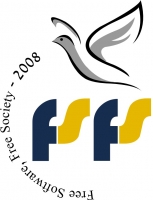
Richard Stallman (at the Free Sofware Free Society Conference today in Kerala, India) seems to have come to the mistaken conclusion (from my own talk, presumably) that I am somehow against Free Software!
SUMMARY: Free/Open Software (notably the first Free Software for creating OAI-compliant Open Access Institutional Repositories, EPrints, created in 2000, distributed under the GNU license, and now used worldwide) has been central to the growth of the Open Access Movement. However, there are also crucial distinctions that need to be made and understood, among the movements for (1) Free/Open source software, (2) Open Access (to peer-reviewed research), (3) Open Data, (4) Creative Commons licensing, and (5) Wikipedia-style collective writing. Open Access (OA) is focussed primarily on refereed research articles. The crucial distinctions revolve mostly around (a) the fundamental difference between author giveaway vs. non-giveaway work and (b) the functional differences between the re-use needs for peer-reviewed research article texts on the one hand, and data, software and other kinds of digital content on the other. (PPT)
"Open Access, Free/Open Software, Open Data, Creative Commons and Wikipedia: Commonalities and Distinctions"
(Powerpoints) But Richard (whom I admire very much) doesn't seem to understand that what I am actually trying to do, for concrete, pragmatic, strategic reasons, is to very explicitly distinguish the special case of ("gratis" Green) OA from the other 4 "open" cases (free/open software, open data, creative commons licensing, and wikipedia) that resemble OA in some respects, but only partially. The purpose of highlighting this distinction is so that we can at long last reach universal Green (gratis) OA. Universal Green OA will then in turn help strengthen and accelerate reaching the goals of the other 4 "open" movements. Conflating all 5 goals today will not.
The reason Richard does not seem to grasp or accept this is also related to the reason he is so effective where he is indeed effective: He is on an ethical crusade (an ethical crusade in which he is just as right as if he were crusading for providing free health care for all, the curing of all diseases, the feeding of all the hungry, the remedying of all injustices). But ethical rectitude in principle is alas insufficient to elicit ethical practice, or at least not on a scale that is anywhere near universal: To achieve that, you sometimes have to appeal to self-interest too, at least initially.
For OA, it is simply hopeless to try to get all or even most creators of digital content to provide OA to their creations today if they do not even want to make them freely available. They all ought to want to, perhaps; but telling them they ought to want to (or that it is more ethical to want to), and why, is not enough.
That is why it is essential to have a practical strategy that is aimed explicitly at that special subset of creators which, without exception, already want to give away their creations (because it already happens to be in their own interest to do so). Those are the authors of the 2.5 million annual articles that are the target of OA and of Green OA mandates: OA's target content. They publish their research only for the sake of uptake, usage, application and impact, not for revenues or fees. That simply cannot be said of the authors of most software (or other kinds of digital content) today.
What I was trying to explain at FSFS was just that this special case (of calling on authors to provide OA to their refereed research articles) has to be distinguished from the general case of calling on all authors of all kinds of digital content (whether it be books, data, software, music, movies, or "knowledge") to make their content free or open.
And the reason is that OA's target content all consists of exception-free creator give-aways already: No ethical case for openness or give-away needs to be made in the special case of OA's target content, because its authors already give it all away. Moreover, although most of them won't go on to do so of their own accord (because they are too busy and/or worried about copyright), most of those authors, when surveyed, state that they would go on to make their give-away articles OA too, willingly, if their institutions or funders were to mandate it: And the evidence is that, when it is indeed mandated, these authors do indeed comply and do it.
So mandates work for author-give-away content. Authors say they will make it OA, willingly, and the actual mandate adoptions confirm that authors do as they said they would do.
There is no reason, however, to expect mandates to work for non-give-away content, today. Authors certainly have not said they would willingly make their non-give-away products (books, software, music, video, data) OA if it were so mandated; nor are there any mandates that test whether they would comply, willingly or unwillingly.
It is not even thinkable today to try to mandate providing OA to content for which its creators not only don't provide OA spontaneously of their own accord, but don't want to provide OA, because they don't want to give it away in the first place (hoping instead to make money from it).
OA mandates have already been sluggish enough so far in just reaching consensus on adoption for just give-away content. What they need is to provide much better and clearer information for authors, their institutions and their public funders on what OA and OA mandates really entail -- and what benefits they bring for authors, their research, their institutions, and the public that funds them -- rather than an unrealistic and confusing raising of the existing hurdles to reaching consensus on mandate adoption by conflating giveaway content with content that its creators do not (yet) even wish to give away, and for which a credible case based on self-interest cannot yet be made.
Having said that, I of course agree completely with Richard Stallman that if software authors are publicly funded for developing their code, the funder can and should mandate that it be made FS/OS! That is a special case in which OA and FS/OS have far more in common than they do in general. But relative to all the software being written today, the portion that is being developed with public funding is, I suspect, quite small (which is not to say that it should not be mandated to make that portion FS/OS!)
Apercus of WOS Meeting: Making Ends Meet in the Creative Commons
Open Access and Open Data
Creative Mix-and-Match Re-Use Is Not What Open Access Is About
On the Deep Disanalogy Between Text and Software and Between Text and Data Insofar as Free/Open Access is Concerned
Distinguish the non-give-away literature from the give-away literature
Re-Use Rights Already Come With the (Green) OA Territory: Judicet Lector
Code vs. Content: Using/Revising Form vs. Using/Revising Findings
Stevan Harnad
American Scientist Open Access Forum
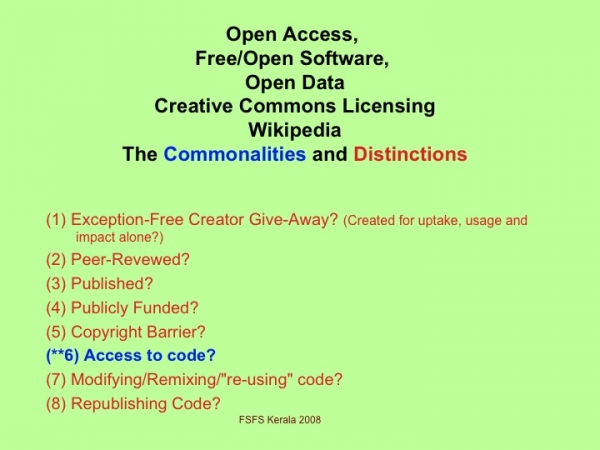
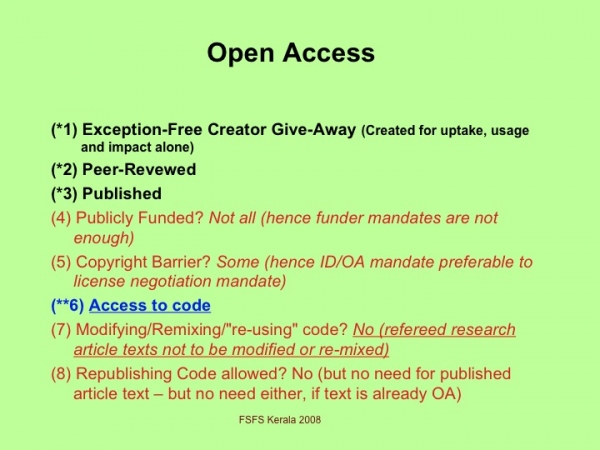
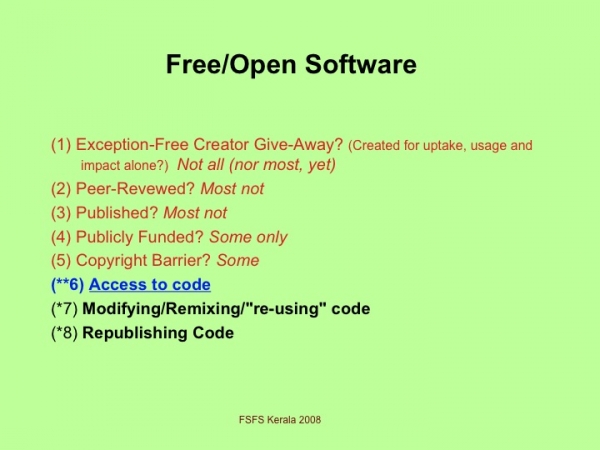
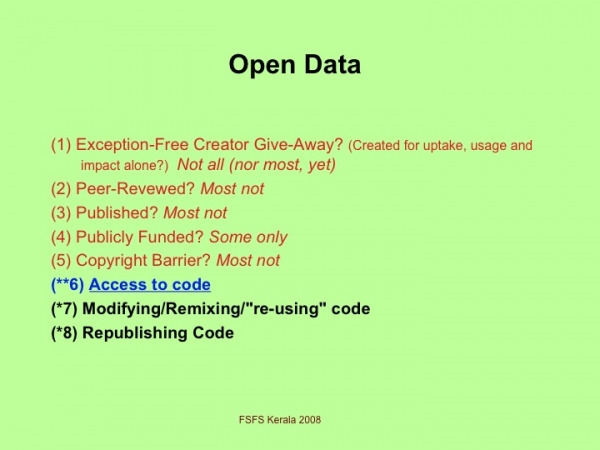
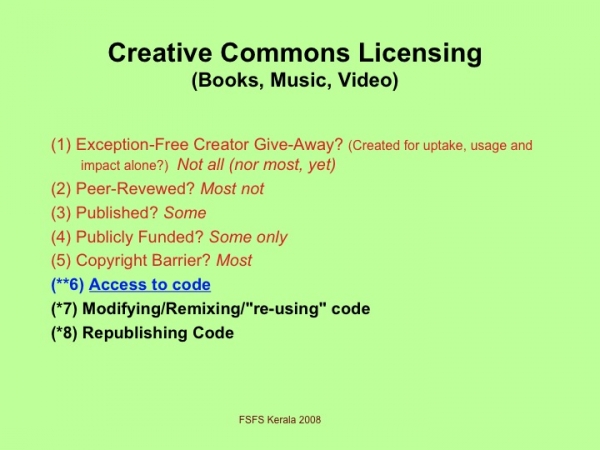
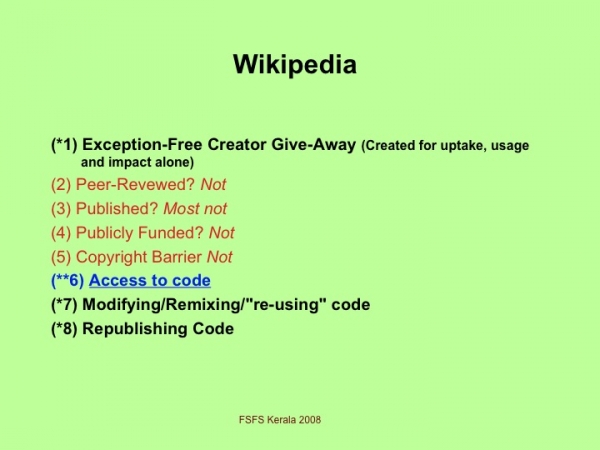
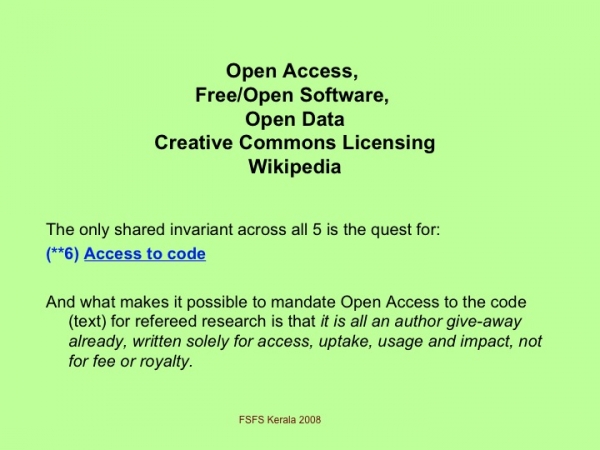
Friday, September 12. 2008
Too Much Ado About PDF
 Most OA self-archiving growth will be prospective, rather than retrospective initially, because it is the current and forward-going research articles that are most urgently needed for research progress, and that is what is being mandated by institutions and funders; the legacy corpus can and will follow thereafter.
Most OA self-archiving growth will be prospective, rather than retrospective initially, because it is the current and forward-going research articles that are most urgently needed for research progress, and that is what is being mandated by institutions and funders; the legacy corpus can and will follow thereafter.Hence, insofar as the current and forward-going articles are concerned, the default option should be to deposit the author's final, peer-reviewed, revised, accepted draft (the postprint) in the author's Open Access Institutional Repository, not necessarily or even preferentially the publisher's PDF.
The author's postprint is the draft with the fewest publisher constraints (and any publisher endorsement of making the PDF OA automatically covers the postprint too).
And, as Alma Swan and Cliff Lynch have pointed out, the PDF is the least useful for data-mining.
And, as can never be pointed out often enough, the purpose of OA self-archiving is the enhancement of access, usage and impact of the research, not the digital preservation of the publisher's PDF! The postprint is a copy, not the original.
(For legacy deposits by authors who no longer have a digital draft of older articles, formatting the PDF, or scanning/OCR and reformatting, are obvious options.)
Stevan Harnad
American Scientist Open Access Forum
« previous page
(Page 2 of 3, totaling 27 entries)
» next page
EnablingOpenScholarship (EOS)
Quicksearch
Syndicate This Blog
Materials You Are Invited To Use To Promote OA Self-Archiving:
Videos:
audio WOS
Wizards of OA -
audio U Indiana
Scientometrics -
The American Scientist Open Access Forum has been chronicling and often directing the course of progress in providing Open Access to Universities' Peer-Reviewed Research Articles since its inception in the US in 1998 by the American Scientist, published by the Sigma Xi Society.
The American Scientist Open Access Forum has been chronicling and often directing the course of progress in providing Open Access to Universities' Peer-Reviewed Research Articles since its inception in the US in 1998 by the American Scientist, published by the Sigma Xi Society.
The Forum is largely for policy-makers at universities, research institutions and research funding agencies worldwide who are interested in institutional Open Acess Provision policy. (It is not a general discussion group for serials, pricing or publishing issues: it is specifically focussed on institutional Open Acess policy.)
You can sign on to the Forum here.
Archives
Calendar
|
|
May '21 | |||||
| Mon | Tue | Wed | Thu | Fri | Sat | Sun |
| 1 | 2 | |||||
| 3 | 4 | 5 | 6 | 7 | 8 | 9 |
| 10 | 11 | 12 | 13 | 14 | 15 | 16 |
| 17 | 18 | 19 | 20 | 21 | 22 | 23 |
| 24 | 25 | 26 | 27 | 28 | 29 | 30 |
| 31 | ||||||
Categories
Blog Administration
Statistics
Last entry: 2018-09-14 13:27
1129 entries written
238 comments have been made


